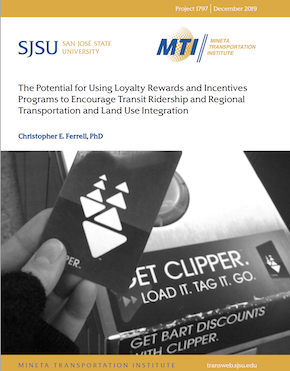- 408-924-7560
- mineta-institute@sjsu.edu
- Donate
The Potential for Using Loyalty Rewards and Incentives Programs to Encourage Transit Ridership and Regional Transportation and Land Use Integration
Transit smart cards can be used as a tool for increasing transit ridership, increasing retail sales in transit-oriented developments (TODs) and eventually, increasing opportunities for retail development in TODs. Instead of providing separate loyalty rewards for each store, or chain of stores, such cards would provide loyalty rewards—in several possible forms, including free transit ride credits, cash rewards, retail purchase discounts, sweepstakes rewards—to all transit riders who patronize TOD retail businesses. Additional rewards could also be given to transit riders who live, work, and shop in TODs, and even to riders who take transit for specific shopping trips in TODs. In this way, smart cards and transit loyalty programs could become not only useful tools for increasing transit ridership, but also tools for targeted economic development of individual TODs, a means to increase economic opportunities and equity for low-income residents and shoppers in inner-city commercial zones, and in their most fully-realized expression, as tools for regional planners to concentrate retail, services and housing in priority development areas consistent with smart-growth planning principles.
This literature review and case study research resulted in the identification of a number of practical lessons, and promising directions for future research:
1. There is a lack of research linking transit smart cards, transit ridership, and shopping behavior in TODs.
2. It is important to retain existing transit riders (reducing ridership “churn”), potentially through the use of loyalty rewards programs and incentives programs to keep these riders or win back those who have given it up.
3. There is both need and potential for rebranding transit’s public image.
4. There are risks of overreach when implementing a transit loyalty rewards and incentives program.
5. There is high potential of incentives and loyalty rewards programs in building transit ridership, TOD, and beyond.
CHRISTOPHER E. FERRELL, PhD
Dr. Ferrell began his planning career in 1995 working for the Metropolitan Transportation Commission (MTC) on intelligent transportation system (ITS) applications for traffic management. Since 2000, he has worked as a transportation consultant and most recently as MTI’s Senior Research Scientist, focusing on the integration of transportation and land use, and travel behavior. In 2010 he co-founded CFA Consultants, a transportation planning and research firm. Dr. Ferrell completed his doctoral studies in city and regional planning at the University of California, Berkeley in 2005.
-
Contact Us
San José State University One Washington Square, San Jose, CA 95192 Phone: 408-924-7560 Email: mineta-institute@sjsu.edu






